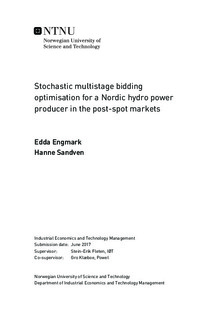Stochastic multistage bidding optimisation for a Nordic hydro power producer in the post-spot markets
Abstract
As a result of an increased focus on climate policy and renewable energy sources, the share of intermittent power in the Nordic power system is growing. With a less predictable production, the interest for trading on the post-spot markets evolves. Producers desire to trade closer to the hour of operation in order to minimise uncertainty of production and demand. This thesis investigates how a Norwegian hydro power producer can maximise daily profit by trading on the post-spot markets. Bidding on the intraday market, Elbas, and the balancing market is modelled as a multistage stochastic mixed integer problem (SMIP) with continuous and binary variables. A comprehensive modelling framework is developed in order to model the market uncertainties. The framework creates realistic demand scenarios for the two markets and implements the model with an internal rolling horizon approach to describe how the bidding problem develops with a decreasing time horizon. The modelling framework is applied to a case study with realistic input data.
A thorough market analysis of Elbas based on exclusive order depth data show that the Norwegian intraday market has very low liquidity. The results show that Elbas premiums normally are higher than the corresponding balancing market premiums, but the probability of a bid being accepted on Elbas is low. As a result of this, considering Elbas bidding does not impact the profit of the hydro power producer significantly. The test cases with higher available production capacity do however benefit more from Elbas trading. With the current market liquidity, Elbas bidding should be considered if it can be done efficiently. The profitability is however considered to increase with more market participants.
